About Bridge AI
Tool for Empowerment
Empowering policy-makers with the best insights for the effective implementation of the Artificial Intelligence Act.
Academia, Public and Private Sector
Funded by the Foundation for Science and Technology (FCT) and PlanAPP, through the General Secretariat of the Presidency of the Council of Ministers, the project is coordinated by INESC-ID, with the collaboration of Champalimaud Foundation and Unbabel, involving international partners and experts in different fields.
Creating Lasting Impact
Work began in early 2024, with the creation of five working groups for different dimensions of application of the AI Act. The project will produce recommendations to national decision-makers based on sound scientific knowledge, experts’ guidance, and the concrete cases from the Centre for Responsible AI, while at the same time creating an ecosystem of collaboration between key stakeholders.
Project Phases

1. Case Studies
The project is based on practical case studies of AI products from the Center for Responsible AI, so that experts from different fields understand concrete risks, challenges, and potential of AI.

2. Working Groups
The work is divided by expert-led groups, focused on regulatory, ethical, literacy and other practical aspects of AI regulation implementation.
Learn more

3. Workshop
In October, experts participate in an immersive, hands-on workshop designed to foster collaboration and create actionable recommendations do public authorities.
4. Recommendations
Bridge AI will deliver a policy-brief to the Portuguese public administration, with main conclusions of each Working Group, policy-oriented recommendations, and proposal of AI literacy instruments for different audiences.
Values

Objectivity and Evidence-Based Analysis
To ensure that decisions and recommendations are rooted in sound scientific principles and not influenced by political biases.

Transparency and Accountability
In all actions and decisions, providing explanations for recommendations, disclosing conflicts of interest, being accountable for conduct, and subject to scrutiny from stakeholders.

Leave No One
Behind
Fostering an inclusive environment that respects diverse perspectives and expertise, ensuring that the project’s outcomes aim to eradicate discrimination, and reduce inequalities.
Aligned with eight of the Sustainable Development Goals
People
Network of Experts
Advisers

Allaine Cerwonka
The Alan Turing Institute

André Martins
IST | IT | Unbabel

John Krakauer
Champalimaud Foundation

Mário Figueiredo
IST | IT

Paulo Dimas
Center for Responsible AI

Pedro Conceição
United Nations

Virgínia Dignum
Umeå University | UN AI Advisory Board
Working Groups

Sara Guerreiro de Sousa
Unbabel
WG1 Leader

Razvan Sandru
Champalimaud Foundation
WG2 Leader

Pedro Vale Gonçalves
Unbabel
WG3 & 5 Leader

Joseph Paton
Champalimaud Foundation
WG4 Leader

André Valente
Champalimaud Foundation

Carme Puche Moré
Film Director

Catarina Pimentel
Champalimaud Foundation

Duarte Almeida
Unbabel

Eduardo Magrani
PhD on Law & Technology

Frederico Lyra
British Embassy Lisbon

Giovanni De Gregorio
UCP

Henrique Sousa Antunes
UCP

Iakovina Kindylidi
VdA

Isabel Caetano
EOSC Association

Isabel Trancoso
INESC-ID

João Marques Martins
FDUL

Kritika Maheshwari
TU Delft

Luís Barreto Xavier
Abreu | UCP

Luísa Coheur
INESC-ID

Magda Cocco
VdA

Mariana Dalblon
Tilburg University

Nicholas Kluge
University of Bonn

Paulo Sousa Mendes
FDUL

Pedro Santa Clara
Shaken not Stirred

Tito Rendas
UCP

Vera Lúcia Raposo
Nova School of Law
Project Team

Helena Moniz
Project Leader
INESC-ID | FLUL

Ana Oliveira
Unbabel

António Novais
Unbabel

Bruno Prezado Silva
Unbabel

Joana Lamego
Champalimaud Foundation

Joana Portugal
JLM&A

Maria Ana Henriques
Unbabel

Maria Roquete
JLM&A

Nuno André
Unbabel

Raul de Araújo
JLM&A

Rodrigo Abreu
INESC-ID

Sara Sá
INESC-ID
Partners
Founding Partners
Communication & Public Relations
Academia
Industry
International
Public Administration
The project was presented to relevant public administration authorities







































